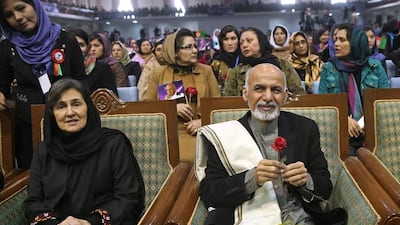KABUL // While Afghanistan’s new president struggles to contain a growing Taliban-led insurgency, he must also try to placate a religious establishment often deeply suspicious of his intentions.
Two months into his job, a number of deadly attacks have shown just how difficult it will be for Ashraf Ghani to bring an end to a war that has now lasted more than 13 years.
But if continued resistance from the Taliban was expected, scepticism from mainstream clerics is another sign that the withdrawal of most foreign troops will not stop demands for the government to adopt a more hardline interpretation of Islam.
Educated in the United States and a former World Bank technocrat who is married to a Lebanese-born Christian, Mr Ghani’s supporters regard his background as a source of hope in a country desperately in need of political and social reform.
Others view his upbringing and some of the events since he took office as proof of Afghanistan drifting from its roots.
For Mr Ghani to succeed in the long term, he will have to appease both camps. While cities such as Kabul are relatively liberal and open to outside influences, most of the country remains conservative and distrustful of interference from the central government. Imams and scholars continue to have huge sway over the population, offering advice on personal, social and political issues. Their views on the new president could ultimately have a crucial impact on the war.
Mullah Mohammed Jan is a cleric from the southern province of Helmand, where the Taliban control large areas of territory. Now a preacher on local radio, he told The National that blasphemous ideas were starting to have a greater influence on society.
“We have witnessed people talking against Islam in the media, during dialogue on human rights, women’s rights and other issues,” he said. “That has not only made us worry, it has made all the nation worry.”
Although still early into his first term, Mr Ghani has experienced the anger that can arise whenever sensitive religious subjects are debated. In October an English-language Afghan newspaper published an article that many people deemed blasphemous. Uproar and a government investigation ensued.
More controversy followed when Mr Ghani’s wife, Rula, gave an interview to the AFP news agency in which she was quoted as supporting a French law that bans women from wearing the niqab. The presidential palace subsequently claimed her comments had been misinterpreted.
Last week the Taliban attacked an NGO in Kabul, which it accused of conducting Christian missionary work. The assault only served to highlight the kind of suspicions held by some clerics.
Mr Ghani’s predecessor, Hamid Karzai, began his presidency as a close ally of the West but became a bitter critic of the US in later years. Some religious conservatives disparaged him but his background as a member of the mujaheddin resistance that fought the Soviets in the 1980s gave him a degree of leeway.
“His family was well known in the country, he was educated by this nation and he stayed with this nation,” said Mr Jan, the cleric from Helmand.
Mr Ghani first ran for the presidency in 2009, when he came a distant fourth. In the intervening years he worked hard on improving his tribal and religious credentials. His appearance has altered, most notably with the growth of a beard, and he recently went on a pilgrimage to Mecca.
Although he had support from several high-profile former mujaheddin in the 2014 election, others were openly hostile and questioned his religious credentials. Now that he is in a national unity government with his rival from the campaign, Abdullah Abdullah, accusations from senior political figures are still heard, albeit behind closed doors.
One source of concern is Mr Ghani’s first vice president, Abdul Rashid Dostum, a pro-government militia commander during the communist era who went on to play a key role in the civil war that followed. Islamists hate Mr Dostum and human-rights groups have accused him of involvement in the massacre of hundreds of Taliban prisoners during the 2001 US-led invasion.
Another critic is Qari Abdul Bari Ahmadi from Maidan Wardak province. A former imam, he stopped working at his mosque in Kabul after Afghan security forces raided it recently for suspected links to the insurgency. While the mosque remains open, Mr Ahmadi is now seeking work elsewhere. He said not even a pistol had been found among his possessions and he blamed the raid on the new president.
“These disrespectful acts against Islam will increase and one reason for this is that [Mr Ghani] is trying to show people he is a serious man who will search places that were not searched before,” he said.
“Another reason is that he is a man who has spent all his life outside the country so he does not [respect] holy places as much as others.”
One of Mr Ghani's first acts in office was to approve the signing of two security agreements that will keep about 12,000 foreign troops in Afghanistan next year. A large majority in the lower house of parliament backed his decision.
The Taliban continue to demand an end to the occupation and only time will tell if they or the president will win over wavering Afghans eager for peace and the rule of law.
Mawlawi Saboor, an elder from the eastern province of Nangarhar, said the sacrifices Afghans had made for Islam in the past must not be ignored.
For the moment, he is willing to give Mr Ghani the benefit of the doubt.
“The government should understand our religious and cultural sensitivities, otherwise people will stand against it by any means,” he said.
foreign.desk@thenational.ae

